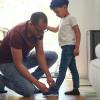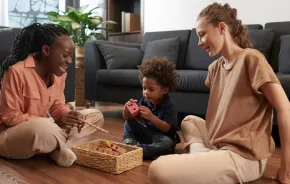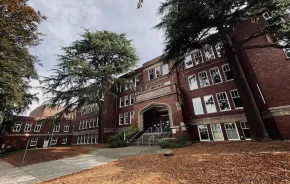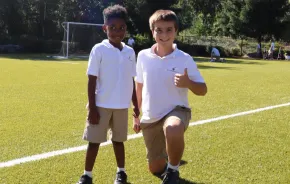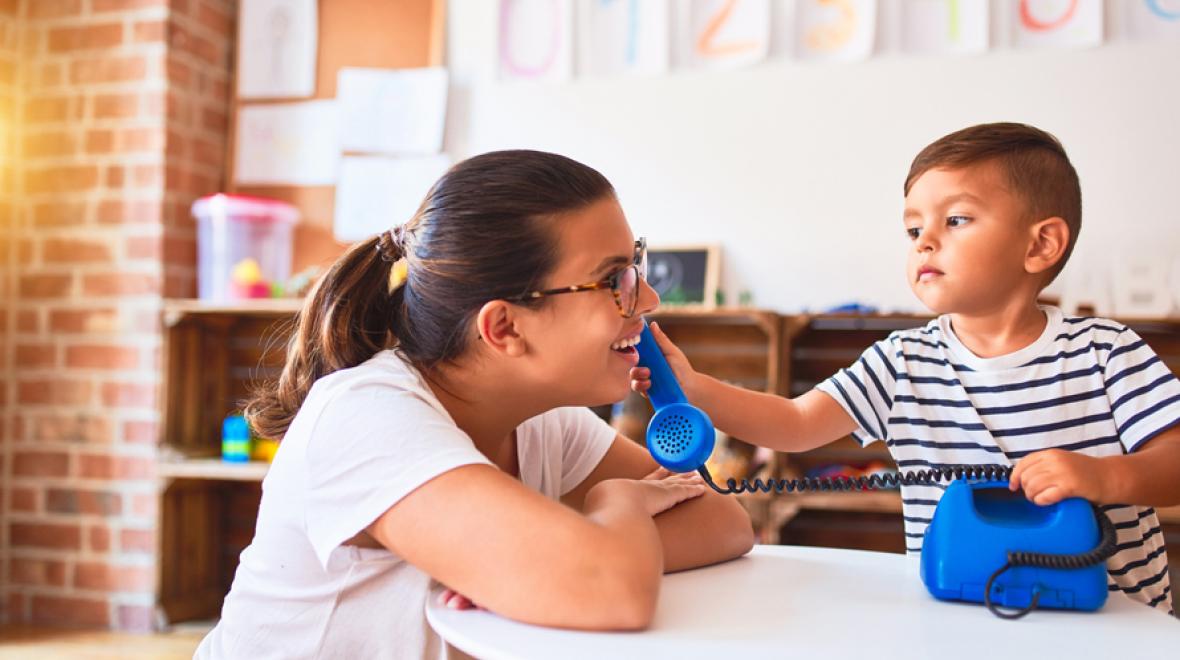
Editor's note: This article was sponsored by Bright Horizons.
I have a dear friend, Michelle, who once shared with me a very sweet anecdote about her daughter Audrey. One day, Audrey came home from preschool proudly gripping a drawing she had made that day in response to a teacher prompt, “My Favorite Thing About My Mom Is ...” It was a self-portrait as far as Michelle could tell, and at the top it read: “My favorite thing about my mom is she lets me mop.” No, dear Audrey was not put upon by a cruel matriarch like some modern-day Cinderella; Michelle hastened to explain that the weekend prior to receiving this flattering parenting kudo, there had been a cleanup-on-aisle-12 moment in their kitchen. When she pulled the mop out to deal with the mess, Audrey watched her with fascination, and asked if she could try it. A love for mopping — and for having a new special “job” — was born.
I like this story, as it in part substantiates for me a chief suspicion I harbor about us parents: We don’t always realize how capable our children can be, particularly when they are very young, nor do we perhaps fully appreciate how much kids crave being empowered to take steps toward independence and mastery of life skills. From the satisfaction and pride of learning to dress themselves or tie their shoes to helping mom and dad with simple household chores such as setting the table, cleaning, basic baking, feeding the cat and more, children can, with the right encouragement and guidance, surprise you with what they can achieve.
I wanted to further test this theory out — and get answers to a basic question: Just what is a child’s job, and how can parents help support the development of age-appropriate life skills in their little ones? So, I went straight to a trusted expert source: a wise and wonderful preschool teacher named Mic, who works at Bright Horizons at Interbay. Here’s what she had to say.
Do some parents arrive at Bright Horizons with an expectation that the preschool experience is all about academic readiness, and if so, how do you communicate what a child’s job really looks like, in terms of age-appropriate learning and development?
This is something that I definitely have experienced, especially with newer parents coming in who are not really sure what a preschooler’s day is supposed to look like; sometimes they have a higher expectation [that is not completely developmentally appropriate]. When this is the case, I start by talking through the basic structure of our days and what we are going to be doing in the class. Whether it is getting the students to write their name or start reading or whatever it is. Building that rapport with the parent gives them trust that a system will be in place in the classroom, and that helps them let go a little bit of some goals that might be unrealistic. It also makes parents feel like they can talk about or express any concerns or expectations that they have for their child.
I have this theory that preschool teachers can sometimes be more aware of what kids are capable of than their parents. Tell us the truth: Have you found that to be the case?
I absolutely think that is probably one of the more common experiences that I have noticed with parents and their children, my students. I imagine that sometimes at home, children are not always able to be presented with opportunities to do things on their own because [those tasks are] just a part of the routine that’s already existed. Parents have raised their child from infancy, and so they are used to helping them get things out of areas or helping them clean up. Whereas at school, I’m their teacher and I know their age group and I know what they’re capable of achieving. But when parents see their children come home and demonstrate what they’ve been learning in school — or hear from them, “I want to help you” or “I want to clean up my own things” or “I want my own bed” — they start to adopt a new mentality around doing whatever it is that will support and empower their child.
Do you see children picking up skills by observing what their peers can do?
Absolutely. I think that’s a huge motivator for a lot of students. Especially in my class, my co-teacher and I always try to say, “Let’s all try!” Some kids might get it the first time. That’s great, but we never of course bring anyone down for not being able to. We teach the kids not to say, “I can’t” or “I can’t do it” but instead say: “Hey, I need some help.” And then we ask them to articulate what they need help with. This has been really helpful for a lot of students, because now they know that it’s okay to ask for help.
For instance, the students put their own sheets on their mats; some students struggle with it a little bit. When that happens, we say, “Okay, go find another friend who also needs help.” And then they work together and help each other out. It’s been really awesome to watch them learn that skill of being able to communicate with another peer and help each other. That teamwork mentality is how the real world actually works, and learning how to work well with others at an early age is such a paramount skill.
How do you describe a preschooler’s job?
A preschooler’s job is to come into a classroom and feel comfortable, but also to have an open mind and feel empowered to try things and to build on their skills. We also have a bunch of actual daily jobs in our classroom, such as lunch helper jobs. Everybody wants to be the lunch helper!
[Ours is an evolving] process of giving them increasing responsibility — preschoolers whom I’ve been teaching really love responsibilities, they love doing things for themselves. I always ask them, do you want to try it on your own or do you want a teacher to help you? Usually they want to do it on their own because that makes them feel good; but they always know that a teacher’s there if they need help.
When I think about it from my perspective as a teacher, I wonder if parents may sometimes be guilty of just not being patient. And that’s kind of the beauty of the setting here. I know it’s hard, but I think parents just get in the routine of always doing things for their kids and not giving them the option to do them for themselves. But as an educator, it makes more sense for me to spend time in the beginning to really teach them systems and routines that will help them help themselves. I work patiently to get them to do things on their own, so I’m not spending eight, nine months zipping up their jackets, washing their placemats or packing up stuff for them. It makes for a more efficient experience for everyone.
How would you suggest parents build on the life skills their preschoolers are learning in the classroom?
I think it starts with changing the way that you talk to your child. For example, instead of saying, “Can you set the table?” say, “Hey, it would really help me if you could set the table. How about you help with the forks?” I also think a huge thing is being a little bit firm sometimes. Give them choices, but also let them know, “Hey, it’s time for dinner and here are some things that need to get done.” Let them know that you need their help: “You can help me with placemats or you can help me with forks. How about you be the Master of the Forks?” And then you build on that each day or each week.
Take the time to get them excited about it; make them realize that this doesn’t mean it’s the end of play time, but that you’re just doing another fun thing now! It’s the same with free play time at school: Students get to choose what they want to play with and then they can choose again. But when free time is over, they know it’s time to clean up their area and they also recognize, “Oh, well, play time is up now, but that’s fine.”
Also, think about how you would want to be talked to, right? It’s the same thing with young children. They don’t want to be told what to do, because they’re getting to that age in preschool where they want to feel really empowered. It’s up to the adult to frame it in a way where they don’t feel like they’re being told what to do, but rather that they’re being empowered to do that thing.
How Bright Horizons Defines a Child’s Job
The child-care experts at Bright Horizons believe that a child’s job is to learn all about the world and fully develop into the very best person that he or she can be. Our service, as the parent who loves our child, is to patiently and protectively (but not too protectively) assist them in doing their job. From stoking their innate sense of adventure, to presenting opportunities for them to practice and master tasks that correspond to their emerging skills and understanding, to providing environments where they are supported by caring and trusted adults, we become the guide who knows when to step in and when to step back.
Here are just a few ideas for encouraging your preschooler’s healthy development:
- Help them make “sense” of the world. Your preschooler is an active, social adventurer with a homing instinct for reactive sensory exploration. Provide them with an environment that offers endless options for exploring their natural world through all their senses. Organize activities that require them to classify various sensory inputs and information; guide them through investigations and experiments; and emphasize music and language projects that develop auditory discrimination skills.
- Help them learn to communicate fully and effectively. Encourage the use of expressive language and increasingly complex sentences through conversations, reading, play acting with props and puppets, storytelling and more. Employ dramatic play and guided social experiences to teach them how to understand, follow and, ultimately, give clear directions. Use labels — on household or classroom items, or in drawings — to begin to connect written words with objects. Help them develop self-reflection by teaching active listening skills and by using open-ended questions to learn what is going on in their curious young minds.
- Help them discover and develop their bodily powers. Movement activities such as hopping, jumping and balancing increase body awareness and integration in preschoolers. Physical skills and confidence grow when they are encouraged to run, climb and bike freely — and to take reasonable, age-appropriate physical risks. Large and small motor skills are expanded and refined through: throwing and catching; drawing and learning to write; and building creatively with a variety of materials.
- Help them understand and discover how things work. Make every day a day of exploration, from spontaneous jaunts around the neighborhood to engagement with learning stations/materials, makerspaces, science and cooking projects, and other ways to tinker. It’s never too early to teach the scientific method: Prompt your preschooler with questions about their natural world, and then help them systematically investigate possible connections and answers.
- Help them connect deeply with others. Model the importance of relationships and feelings with your preschooler. Use conversations and open-ended questions about feelings to encourage the development and habit of empathy. Coach them about the importance of friendship by being attentive during their social encounters and leaning in to model mediation when conflicts with peers arise. Introduce the concept of collaboration through activities and projects that emphasize taking turns, sharing and helping others. Deepen understanding of what it means to care responsibly for others by creating jobs such as feeding pets, setting the table or helping to clean up.
Find positive parenting strategies and family resources on the Bright Horizons website.
Sponsored by:








